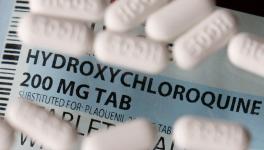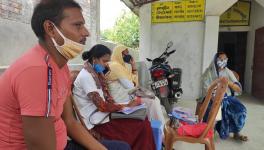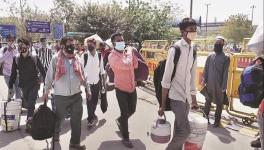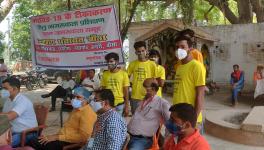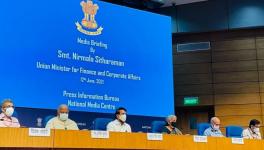COVID-19: Treatment Plan Comes in Too Late Amid Second Wave
Currently, India is grappling with the second and so far the worst wave of the COVID-19 pandemic, with over 4,00,000 infections surging everyday and a crumbling healthcare system. However, hospitals and doctors continue to face woes owing to an outdated COVID-19 treatment strategy—leading to the continuation of such treatments which have reportedly been found to be ineffective globally.
The alleged irrational prescription of medicines and the lack of clarity on their use has triggered an inflated demand and set the patients in panic – fuelling black marketing and harassment.
Even as patients and families scramble to find drugs such as Remdesivir in despair along with hydroxychloroquine, favipiravir, and ivermectin, the effectiveness of these medications have not been proven yet.
Also read: COVID-19: Patients Subjected to Inhumane Neglect, Apathy Inside State-run Facilities
The negligence and delay in updating treatments has reportedly added to the uncontrollable second wave in India, claiming more and more lives everyday. While the Modi government ignored repeated warnings about the second wave, the country’s task force which was responsible for preparing a dynamic response to the pandemic and heading its treatment plan failed to even meet in the two crucial months of February and March, leading up to the surge in cases in April.
India finally updated its strategy on April 22, however, many outdated guidelines still find a place in the flowchart released by the Indian Council of Medical Research (ICMR).
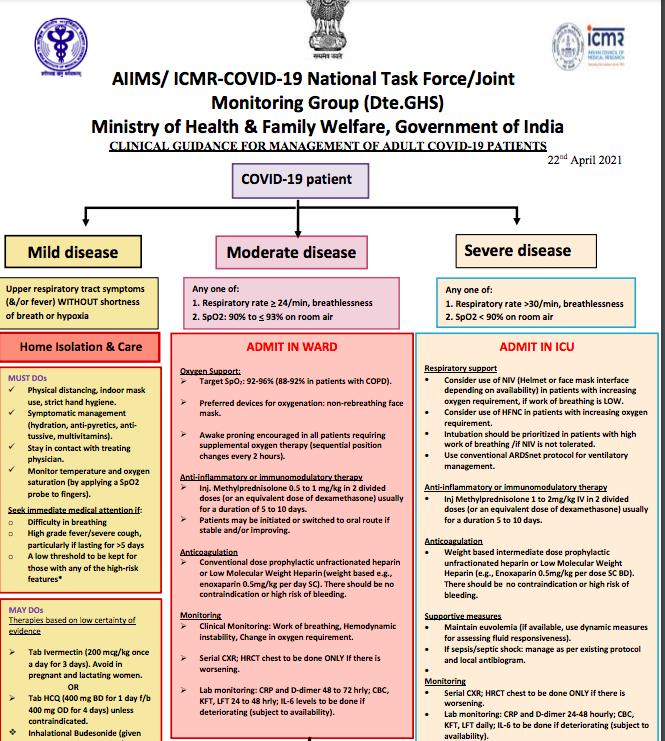
An analysis of the new guidelines by Quartz shows that some of the recommendations in the new document are the same as the initial set that the government had announced in March 2020, when the world hardly knew anything about SARS-CoV-2 and COVID-19 cases were only beginning to emerge in India.
Drugs such as hydroxychloroquine continue to find space in the guidelines despite proving to be ineffective and even banned in the European Union. The same holds true for ivermectin, an anti-parasitic that was initially believed to help reduce the viral load. Doctors believe there is not enough evidence to support the claim that the drug has any real benefit for COVID-19 patients.
Despite clear guidelines from the World Health Organisation on both Remdesiver and plasma therapy, both find space in the “unapproved drug” section of the ICMR flow chart.
Speaking with NewsClick about this, Sarojini N of Sama Health Resource Group for Women said, “Many patients without any comorbidities are irrationally prescribed all kinds of medicines such as steroids, antibiotics, etc. Of course, there are many who are desperately sending requests for Remdesivir, Tocilizumab, Convalescent Plasma. At present, the clinical management protocols recommend the use of Remdesivir, Tocilizumab and Convalescent Plasma, but, they should only be used in a defined subgroup of patients. Despite this, irrational prescriptions continue to be given for various medical products which have a limited role in treating only certain COVID-19 patients. This ‘inflated demand’ along with scare among ordinary people is fuelling black marketing, inflated prices etc. Government must urgently regulate and conduct effective public education campaigns to minimise unnecessary demand, in order to reduce misuse of these medicines.”
While the manufacturers of favipiravir and itolizumab-- two of the most commonly prescribed drugs for COVID-19 patients have claimed efficacy of these drugs based on inconclusive clinical trials, large randomised trials have shown no benefit on mortality from hydroxychloroquine. For plasma and tocilizumab, randomised trials suggest that they may help only during a small time frame—very early in the disease course for plasma, and within 24 hours of admission into the intensive care unit for tocilizumab.
Also read: COVID-19: The Elusive Remdesivir and a Catastrophe in Maharashtra
Yet, India’s Ministry of Health as well as the state governments have included the drugs in their COVID-19 treatment guidelines, often going against evidence from randomised trials and triggering the widespread and routine use of these drugs by doctors.
Concerns over Plasma therapy have been flagged repeatedly by concerned clinicians, public health professionals and scientists. In a recent letter to ICMR and the principal scientific advisor, the issue of irrational and non- scientific use of convalescent plasma for COVID-19 was raised. The letter states that current evidence on plasma therapy and how the ICMR guidelines are framed is not based on the existing evidence. It highlights, “The world's first randomised controlled trial on convalescent plasma in 39 public and private hospitals across India found “convalescent plasma was not associated with a reduction in progression to severe COVID-19 or all-cause mortality. This trial has high generalisability and approximates convalescent plasma use in real life settings with limited laboratory capacity.”
It clearly points out to a problematic scenario arising because of the guidelines issued by ICMR/AIIMS which currently recommends plasma therapy (April 2021 version) 5 as “off label” use. “This is rather unusual as off-label use by its very definition implies “unapproved use”. We would also like to point out that international guidelines such as those from National Institutes of Health (NIH), USA6 and the IDSA guidelines also recommend against generaluse of plasma therapy for COVID-19.” it states.
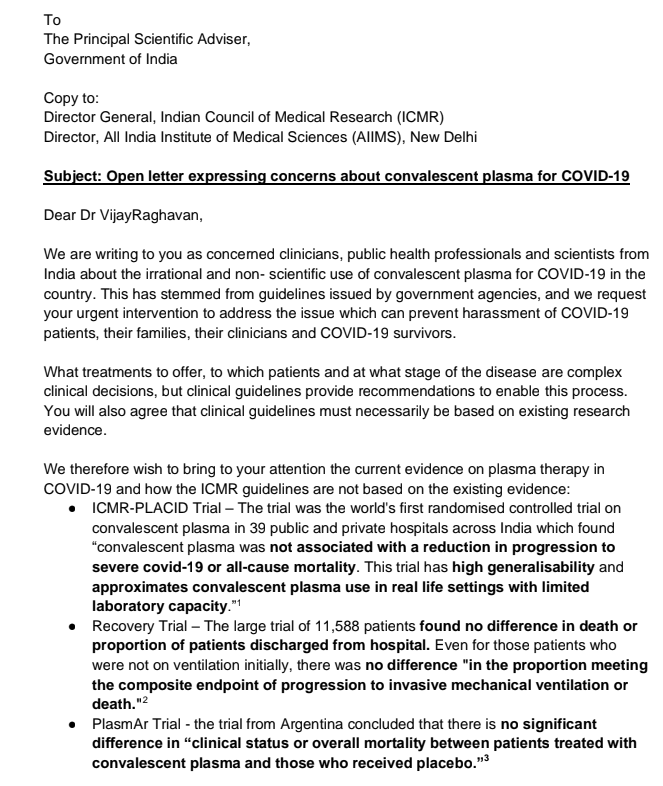
Pointing out the problems of clarity and comprehensiveness and the effects on patients, Soumyadeep Bhaumik, medical doctor and international public health specialist, said, “The strategy has been updated after a long-long time, the update is a mere flow chart when we compare it to the international standards. We have referred to the global standards which are far more comprehensive in terms of the harms, side effects and the benefits. In such a scenario, Detailed documentation is needed. The clinical care that we provide, exists in a context, for example, with the extensively used drug Remdisiver, crucial information is missing – will it save lives? Will it prevent mechanical ventilation? These are crucial questions which remain unclear. More importantly, one needs to keep in mind who are the people developing these guidelines and their conflict of interests.”
Sarojini N suggested, “ In order to avoid unnecessary use of COVID-19 related medications and also to reduce panic, the standard treatment guidelines must be adhered to. Keeping in view the reports about irrational prescribing of expensive medicines which are of marginal or circumscribed value in reducing COVID-19 mortality (Remdesivir, Tocilizumab, etc.), the algorithms issued by AIIMS - ICMR Task Force must be rigorously followed by all private and public hospitals.”
Also Read: COVID-19: Ensure Free Treatment and Uniform Price for Vaccines, JSA Says in Statement
Get the latest reports & analysis with people's perspective on Protests, movements & deep analytical videos, discussions of the current affairs in your Telegram app. Subscribe to NewsClick's Telegram channel & get Real-Time updates on stories, as they get published on our website.









